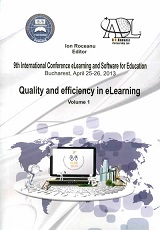INCREASING THE EFFICIENCY OF E-LEARNING SUPPORTED ENGLISH COURSES FOR ENGINEERING STUDENTS IN MULTICULTURAL GROUPS
INCREASING THE EFFICIENCY OF E-LEARNING SUPPORTED ENGLISH COURSES FOR ENGINEERING STUDENTS IN MULTICULTURAL GROUPS
Author(s): Yolanda Mirela CatellySubject(s): Education
Published by: Carol I National Defence University Publishing House
Keywords: foreign language course; e-learning; multicultural groups; engineering students; enhancing instructional process quality
Summary/Abstract: With the increase of e-learning use in foreign language courses, a challenge has emerged for the teachers who are also course designers and researchers of the instructional process quality, viz. the existence of sometimes wide differences as far as the implications of the cultural dimensions influence upon the students’ successful learning are concerned. The various cultural backgrounds of the students in a multicultural group in terms of, among others, their education, age, gender, religion, customs, beliefs, fields of study, seem to determine their specific approach to using e-learning in their foreign language acquisition process, both at university and at home. There is not much research done over such aspects, and the identified titles are mainly focused on one culture only, and not on the variety presupposed by a multicultural group. The data collected in the literature also emphasize the fact that it is not only the foreign language discipline that is culturally impacted, but most other subject areas as well. For instance, the e-learning specific pedagogical approach largely resorts to collaborative work in pairs and groups, and this may contravene to local methodologies. Therefore, the aim of this study is to investigate the multicultural group students’ various types of perception, behavior, background exposure and learning habits as regards e-learning, by using an array of research instruments (questionnaires, interviews, focus groups), in order to identify viewpoints and attitudes due to the students’ own culture. We maintain that the results of such an analysis may be conducive to innovatively reshaping the course tasks in order to optimize the learners’ utilization of e-learning at a higher ‘addressability’ level, thus increasing their efficiency.
Journal: Conference proceedings of »eLearning and Software for Education« (eLSE)
- Issue Year: 9/2013
- Issue No: 01
- Page Range: 555-560
- Page Count: 6
- Language: English

